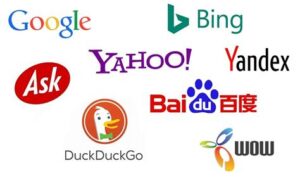Back to: Computer Science JSS 3
Welcome to class!
In today’s class, we shall be talking about the internet, meaning and examples of search engines. Please enjoy the class!
The Internet – Meaning and Examples of Search Engines
Imagine a vast ocean of information, constantly churning and expanding. That’s the internet! It’s a global network of interconnected computers, holding a treasure trove of data waiting to be discovered. But how do we navigate this immense ocean and find the specific pearls we’re looking for? That’s where search engines come in, acting as our trusty ships and navigational tools.
The Meaning of Internet:

At its core, the internet is a system of interconnected devices communicating with each other. Websites are like islands within this ocean, each with its unique address and content. To visit these islands, we use our web browsers, like ships sailing the digital waves.
Think of web pages as treasure maps, with hyperlinks acting as anchor points connecting them. Clicking a hyperlink is like raising the sails and setting course for another island, exploring new realms of information.
Meaning of Search Engines

But navigating this vast ocean without a map can be overwhelming. That’s where search engines come in. They’re like cartographers, meticulously indexing and ranking the countless web pages, making them discoverable through searches.
Here’s how they work:

- Crawling: Imagine tireless bots, called crawlers, constantly scouring the web, visiting and analyzing websites. They follow hyperlinks, discovering new islands and adding them to their ever-growing map.
- Indexing: Once a website is discovered, its content is analyzed and stored in a massive index, like a giant library catalog. This includes keywords, phrases, and even images, making it easier to find relevant information.
- Ranking: When you type a search query, the engine rummages through its index, matching your keywords to the indexed content. Using complex algorithms, they rank the most relevant and trustworthy websites, presenting them as search results.
Examples of Popular Search Engine
- Google: The undisputed king of the search engine jungle, Google boasts an incredibly sophisticated algorithm and a user-friendly interface. It’s the go-to tool for most internet users worldwide.
- Bing: Microsoft’s search engine challenger, Bing, offers a strong visual search feature and rewards program, making it a popular choice for some users.
- DuckDuckGo: This privacy-focused search engine doesn’t track your searches or personalize results, appealing to users concerned about online data collection.
Search engines are constantly evolving, incorporating new features like image and video search, voice search, and even knowledge graphs that provide instant summaries of complex topics.
Remember, the internet is a powerful tool, and search engines are your gateway to its vast knowledge. Use them wisely, explore different options, and be critical of the information you encounter. With the right approach, you can navigate the digital ocean and discover countless treasures!
We have come to the end of today’s class. I hope you enjoyed the class!
In the next class, we shall be discussing the Practical uses of search engines.
In case you require further assistance or have any questions, feel free to ask in the comment section below, and trust us to respond as soon as possible. Cheers!
Question Time:
Section A: Objective Test
- The internet is:
(a) A physical network of computers
(b) A collection of online documents
(c) A global system of interconnected networks
(d) A type of software application
- What is the function of a web browser?
(a) To store and organize files
(b) To send and receive emails
(c) To access and display web pages
(d) To run computer programs
- What is the main purpose of a search engine?
(a) To create new websites
(b) To track user activity
(c) To provide access to online information
(d) To sell advertising space
- Which of the following is NOT a popular search engine?
(a) Google
(b) Bing
(c) Yahoo
(d) Wikipedia
- How do search engines rank websites?
(a) By the date they were created
(b) By the number of times they are linked to
(c) By the amount of money they pay
(d) All of the above

How can I download these notes?
You will be able to do that once you download our app
how can I download the lesson note please?
How can I download this note and write for the jss3 in their class as a teacher
Please download the Afrilearn app from your Android or Apple store, and get access to download the lesson notes.